Top 10 Essential Commercial Kitchen Equipment for New Restaurant Owners
By: Restaurant Equippers • April. 22, 2025
Top 10 Essential Commercial Kitchen Equipment for New Restaurant Owners
Starting a new restaurant is an exciting venture.
It's a chance to bring your culinary vision to life but also a complex process. One of the most critical aspects is setting up your kitchen. The right commercial kitchen equipment can make or break your restaurant, affecting everything from food quality to kitchen efficiency.
This guide will help you navigate this crucial step. We'll explore the top 10 essential pieces of commercial kitchen equipment for new restaurant owners, explore why each is important, and discuss how it contributes to your restaurant's success. From refrigeration units to commercial sinks, we've got you covered.
By the end of this guide, you'll be well-equipped to make informed decisions. You'll be one step closer to launching your restaurant successfully. So, let's dive in and start building your dream kitchen.
Understanding Commercial Kitchen Equipment Needs
Setting up a new restaurant kitchen requires careful planning and understanding of your equipment needs. Each piece of commercial kitchen equipment plays a pivotal role in daily operations.
The right equipment ensures efficiency and enhances the quality of your dishes. When choosing equipment, consider your menu and kitchen space. A well-thought-out selection aligns with your culinary style and fits the available space. This approach helps maintain a smooth workflow and increases productivity. Moreover, the equipment's energy efficiency and ease of use should be considered. Energy-efficient appliances reduce operating costs and help the environment. Equipment that is simple to operate enhances staff productivity and satisfaction. Your choices today set the foundation for your restaurant's success and sustainability.
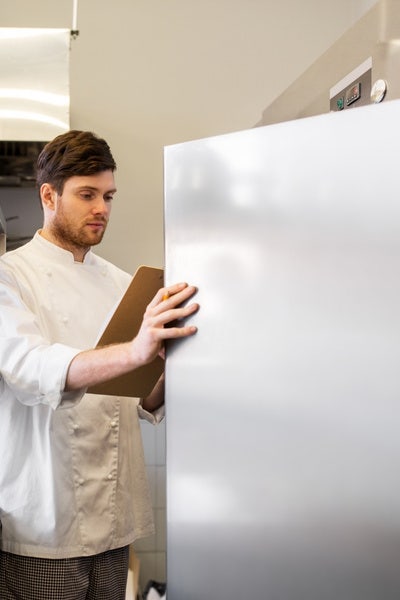

Refrigeration Units
Refrigeration units are the backbone of food safety in restaurants. They maintain the necessary temperature for safe food storage. Refrigerators and freezers prevent spoilage and foodborne illnesses. When selecting refrigeration units, consider the space and capacity they require. The size of your kitchen and storage needs will dictate the type you choose. Walk-in coolers are ideal for large kitchens, while reach-in models suit smaller spaces. Energy efficiency is another crucial consideration. Energy-efficient units can significantly reduce electricity costs. Look for models with ENERGY STAR ratings for optimal performance.
Refrigeration units come in various types to suit different needs:
- Walk-In Coolers: Ideal for bulk storage
- Reach-In Refrigerators: Suitable for smaller quantities
- Under-Counter Refrigerators: Convenient for quick access
- Blast Chillers: Quickly reduce food temperature
Regular maintenance of refrigeration units is vital for their longevity. Cleaning the coils and checking the seals ensure they function efficiently. Proper maintenance minimizes breakdowns and extends the lifespan of the equipment, thus securing your investment in the long run.
Cooking Ranges and Ovens
Cooking ranges and ovens are essential commercial kitchen equipment for any restaurant. They are crucial for preparing a wide variety of dishes. Reliable ranges and ovens can help ensure that each meal meets your quality standards. Selecting the right range or oven depends on your menu and kitchen needs. Gas ranges offer precise heat control, which is perfect for cooking delicate dishes. Electric ranges, however, provide even heat distribution, which is ideal for baking. Combination oven ranges offer versatility, combining multiple cooking functions. These are highly beneficial for kitchens with diverse culinary requirements. Specialized equipment, like pizza ovens or convection ovens, serves niche cooking demands.
Key types of ovens include:
- Convection Ovens: Circulate air for even cooking
- Combination Ovens: Offer various cooking methods
- Pizza Ovens: Dedicated to high temperatures for crispy crusts
- Deck Ovens: Provide excellent baking results
Regularly clean and maintain your ranges and ovens for optimal performance. Check for gas leaks, and ensure electric connections are secure. Timely maintenance will extend the life of your equipment, ensuring your kitchen runs smoothly and safely at all times.
Griddles and Charbroilers
Griddles and charbroilers are versatile pieces of commercial kitchen equipment. They are suitable for cooking a wide variety of dishes. Many restaurants rely on them for their menu flexibility. Griddles offer a flat surface heated by electricity or gas. They are perfect for pancakes, eggs, or burgers. They provide even heat, making it simple to cook multiple items simultaneously. Charbroilers, on the other hand, impart a distinct smoky flavor. They use gas or infrared heat to cook foods directly over flames. They are excellent for meats, giving them those sought-after grill marks.
Consider these factors when selecting griddles and charbroilers:
- Size and Space: Choose based on your kitchen's layout.
- Fuel Type: Decide between gas and electric.
- Construction Material: Stainless steel is durable and easy to clean.
- Heat Distribution: Ensure even cooking across the surface.
Incorporating quality griddles and charbroilers enhances menu offerings. Regular maintenance, like cleaning the surface and inspecting burners, will prolong their lifespan and maintain food quality.
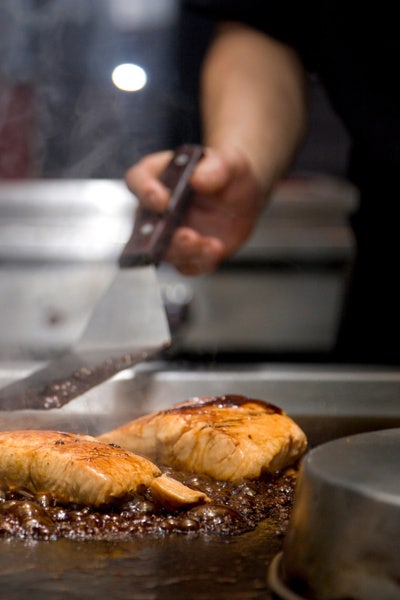

Commercial Deep Fryers
Commercial deep fryers are vital for restaurants with fried food options. These appliances can quickly handle high volumes efficiently. They meet the demand for fries, chicken wings, and various appetizers. Choosing the right deep fryer involves considering oil capacity. The size will impact how much food you can fry at once. Larger capacities cater to busy kitchens with heavy orders. Safety and energy efficiency are also crucial factors. Look for models with auto shut-off features and adjustable thermostats. These ensure the fryer operates optimally while minimizing energy costs.
Key considerations for selecting a deep fryer include:
- Oil Capacity: Matches your typical order volume.
- Safety Features: Automatic shut-off options.
- Ease of Cleaning: Removable components for hassle-free maintenance.
- Energy Efficiency: Helps reduce operating expenses.
Incorporating a high-quality commercial deep fryer can significantly boost your menu variety. Proper care and regular oil changes will keep it running smoothly, ensuring food is always delicious and safe.
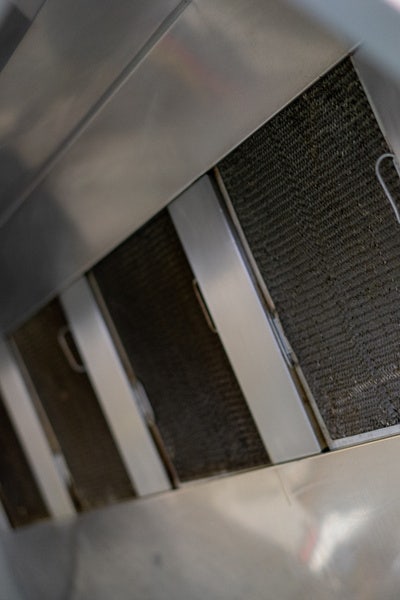

Ventilation Systems
Effective ventilation systems are crucial in maintaining a comfortable and safe kitchen environment. They help remove excess heat, smoke, and odors, ensuring clean air for staff and customers. The importance of a ventilation system cannot be overstated. It protects against grease buildup, which can pose fire hazards. By maintaining airflow, these systems also support optimal equipment performance. Selecting the right system depends on your kitchen's size and layout. Consider the capacity to handle emissions from the specific appliances in use.
Essential benefits of ventilation systems include:
- Fire Safety: Reduces grease accumulation, minimizing fire risk.
- Air Quality: Ensures a breathable environment by removing contaminants.
- Energy Efficiency: Promotes longer appliance life by managing heat.
Investing in a robust ventilation system protects both your kitchen and staff health. Regular maintenance is key to ensuring its efficiency and longevity, creating a more pleasant dining experience.
Food Processors and Mixers
Food processors and mixers streamline food preparation in any commercial kitchen. They provide speed and efficiency, saving time and labor costs. These appliances are essential for handling large volumes of ingredients, making them indispensable. Food processors offer versatility, from chopping to pureeing. They are invaluable for preparing sauces, soups, and mixtures quickly. Choose one based on capacity, power, and available attachments. Mixers are perfect for baking needs and dough preparation. High-volume restaurants and bakeries benefit greatly from their robust performance. Stand mixers and floor models cater to various operational needs.
When selecting these appliances, consider the following benefits:
- Efficiency: Speeds up prep time, increasing productivity.
- Consistency: Ensures uniformity in prepared dishes.
- Versatility: Handles different tasks with multiple settings and attachments.
Remember, maintenance is crucial to extend equipment lifespan. Regular cleaning prevents downtime and keeps operations running smoothly. By investing in reliable food processors and mixers, restaurant owners can enhance their menu offerings while reducing prep time.
Commercial Dishwashers
Commercial dishwashers are critical for maintaining hygiene standards in a busy restaurant. Quick turnaround is essential to keep up with the high demand during peak hours. These appliances ensure that dishes, glasses, and utensils are spotlessly clean and ready for use. The efficiency of a commercial dishwasher reduces manual labor significantly. Investing in an energy-efficient model can also lower operating costs in the long run. Options range from under-counter models to large conveyor dishwashers, depending on your volume needs.
When selecting a dishwasher, keep these considerations in mind:
- Capacity: Matches the volume of dishes processed daily.
- Cycle Time: Meets the restaurant's pace and turnover needs.
- Energy Efficiency: Reduces energy consumption and costs.
Maintenance and regular cleaning of dishwashers are crucial to their performance. Proper upkeep prevents breakdowns and prolongs the life of the equipment. In choosing the right commercial dishwasher, focus on its ability to handle the workload while keeping operating costs manageable. This decision directly impacts kitchen efficiency and overall restaurant operations.
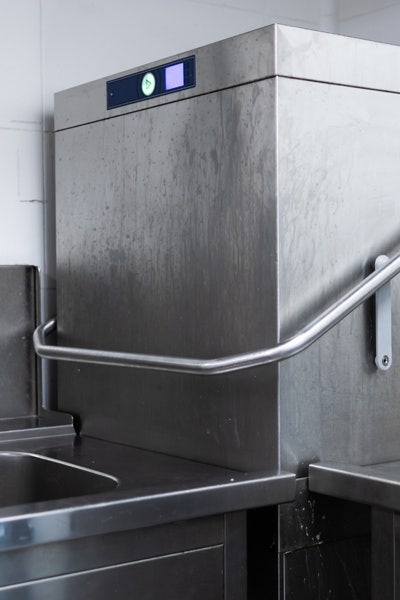

Shelving and Storage Solutions
Adequate shelving and storage are essential for any efficient commercial kitchen. They help keep ingredients and kitchen tools organized and accessible. Well-planned storage solutions minimize clutter, creating a safer work environment. Assess the kitchen layout to determine the most effective storage configurations. Consider adjustable shelving for flexibility. This allows you to adapt to changing inventory needs as your menu evolves.
Here are some critical factors to consider when choosing storage solutions:
- Material: Opt for durable, easy-to-clean materials like stainless steel.
- Capacity: Ensure shelves can bear the weight of stored items.
- Accessibility: Design shelves for easy reach and visibility of ingredients.
Proper storage solutions improve workflow by ensuring everything has a designated place. This not only boosts kitchen efficiency but also enhances the speed of service. Selecting the right shelving and storage systems can save time and energy, critical assets in any bustling restaurant environment.
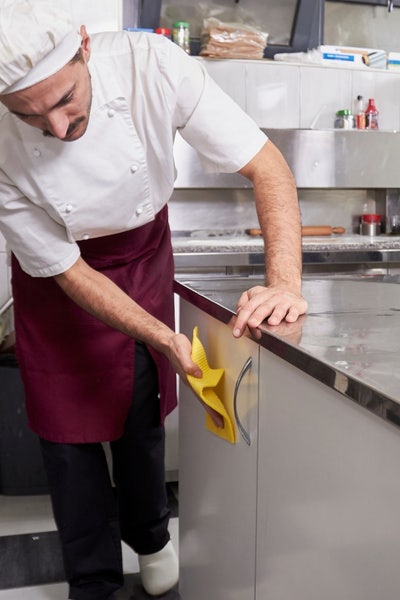

Food Safety and Sanitation Equipment
Food safety and sanitation are critical in the restaurant industry. The right equipment ensures your kitchen maintains high cleanliness standards. Investing in proper sanitation tools helps keep foodborne illnesses at bay. Key items for maintaining hygiene include thermometers, sanitizing stations, and proper waste disposal systems. These tools help ensure food is cooked and stored at safe temperatures. Regular use of sanitation equipment boosts safety for both staff and patrons.
Consider these essential food safety and sanitation items:
- Thermometers: Ensures food is at the correct temperature.
- Sanitizing Stations: Provides quick and effective cleaning solutions.
- Waste Disposal: Manages food waste in an eco-friendly manner.
Prioritize the placement of sanitation equipment within easy reach in the kitchen layout. This encourages frequent use and promotes consistent hygiene practices. By making food safety an integral part of daily operations, your restaurant can operate smoothly while meeting health regulations. This commitment enhances customer trust and establishes a reliable reputation in the industry.
Commercial Sinks and Faucets
Commercial sinks and faucets play an essential role in maintaining kitchen hygiene. They facilitate cleaning, food preparation, and waste management. Durable sinks are necessary for the high-volume demands of a commercial kitchen. Stainless steel sinks are a popular choice due to their durability and ease of cleaning. They resist corrosion and can handle frequent use without damage. Selecting the right size and type is crucial for efficiency.
Important considerations include:
- Multi-compartment Sinks: Versatile for washing, rinsing, and sanitizing.
- Pre-rinse Faucets: Helpful for removing leftover food debris.
- ADA-compliant Sinks: Ensures accessibility for all staff members.
When planning the layout, consider positioning sinks near preparation areas. This reduces time spent moving between stations and improves workflow. By investing in quality commercial sinks and faucets, restaurant owners can promote a clean, efficient kitchen environment. This attention to detail contributes to the overall success and compliance of your restaurant operations.
Share

























